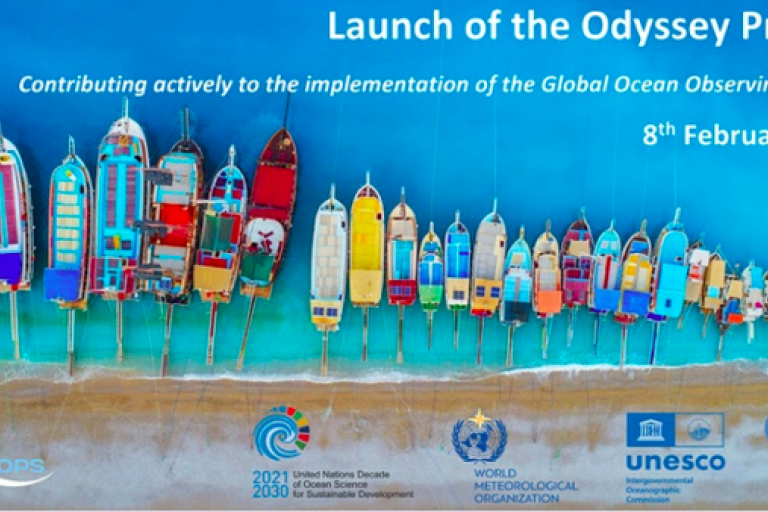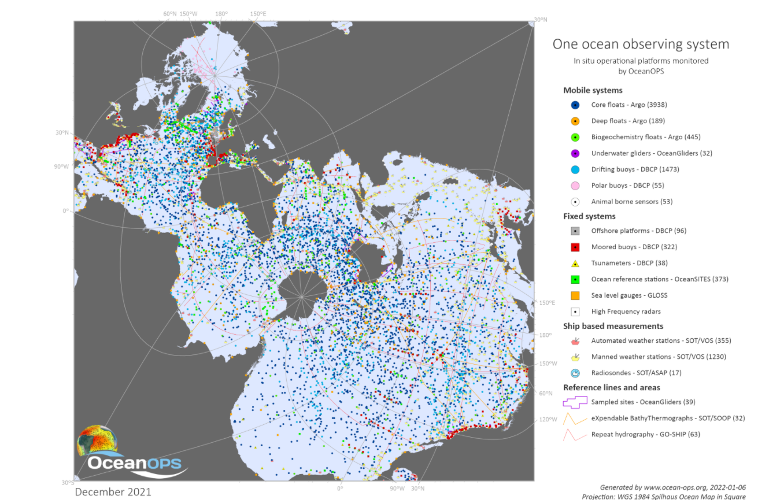Odyssey project supports ocean science
The Joint Centre of the World Meteorological Organization and the Intergovernmental Oceanographic Commission of UNESCO, OceanOPS, is launching the Odyssey Project endorsed by the United Nations Decade of Ocean Science for Sustainable Development. The Odyssey Project will support the Global Ocean Observing System.

The Joint Centre of the World Meteorological Organization and the Intergovernmental Oceanographic Commission of UNESCO, OceanOPS, is launching the Odyssey Project endorsed by the United Nations Decade of Ocean Science for Sustainable Development. The Odyssey Project will support the Global Ocean Observing System.
On 8 February, diverse international stakeholders – including citizens, scientists, sailors, shipping industries and fishing companies - will take part in the kick-off meeting of the Odyssey Project to express their engagement within the international ocean observing community in providing sustained support for ocean observations. It comes ahead of the One Ocean Summit in Brest on 9-11 February 2022.
“2022 is the year we must stop the decline in the Ocean’s health. The United Nations Decade of Ocean Science underlies all our efforts in this regard and the Global Ocean Observing System is one of its most effective tools. I am thus super-excited about the launch of the Odyssey project and the prospect of met-ocean observations being made from yacht hulls around the world”, says Peter Thomson, the United Nations Secetary-General's Special Envoy for the Ocean.
The Odyssey project calls on civil society to support the Global Ocean Observing System (GOOS) implementation and unlock the potential of citizens, ocean race sailors, mariners, NGOs and private sector, to ensure a more complete knowledge of the ocean and the atmosphere above it, delivering data for effective prediction of how the ocean and climate may change in coming years.
“The Odyssey Project of the United Nations Ocean Decade, 2021-2030, intends to take a big step forward in involving citizens, sailors, and businesses in observing the ocean, and this is essential for connecting people with the ocean and creating the ambition and ability to better protect our blue home and manage its space and resources”, says Vladimir Ryabinin, Executive Secretary of UNESCO's Intergovernmental Oceanographic Commission (IOC-UNESCO).
As the global population is set to reach more than 9 billion people by 2050, impacts on the ocean associated with human activities will escalate. Understanding the variability and trends of the ocean and the related impacts on our society, through sustained ocean observations and ocean science, is essential to predict the consequences of change, guide mitigation and design adaptation for the benefit of the nature and humankind.
“WMO can trace its origins back to the need to provide weather information to mariners and an important part of that has always been observations on the open ocean. This initiative brings this concept into the 21st century. The data collected will enhance not just weather information and warnings for mariners, but also provide crucial intelligence on the state of the Earth system, improving forecasts and climate information for everyone,” says Anthony Rea, Director of Infrastructure at the World Meteorological Organization.
Contributing to the GOOS and the UN Ocean Decade through the Odyssey Project

Conscious of the importance of civil society engagement to support ocean observations and that the development and sustainability of the GOOS urgently need targeted increases in observations, OceanOPS will lead the Odyssey Project.
During the last 10 years, OceanOPS has developed innovative partnerships with civil society, particularly with NGOs and racing yachts to deploy observing instruments in hard-to-reach locations, contributing to the real-time observation and stewardship of the ocean with lower carbon footprints. These partnerships and activities were even more strengthened during the pandemic, when deployment of oceanographic instruments by research vessels was deeply impacted by Covid-19 restrictions.
“Other partnerships or initiatives are being developed to generalize met-ocean observations from merchant ships, fishing fleets, and other marine operators or ship users from the coast to the open ocean, but they have not yet unleashed their full potential" explains Mathieu Belbéoch, OceanOPS manager. "The Odyssey project will provide the framework for the co-development of an operational contribution of civil society to the GOOS infrastructure" adds Belbéoch.
Odyssey embodies the level of response we need to face climate issues and will help strengthen international collaborations within and outside the ocean observing community. These collaborations, based on the observations’ collection, data sharing and analyses, scientific and technological developments, will be essential to develop such a project.
Through all its partners and a vast range of communication channels, Odyssey will be also a powerful platform to promote the benefits of the GOOS to a larger public and the importance of ocean observations to deliver the essential information needed for many societal applications, such as climate change and weather forecast.
On the conclusion of the Odyssey launching event, all participants will issue and sign a Brest declaration to express their support for ocean observations contributing to the Global Ocean Observing System and ensuring that met-ocean data, acquired following international standards, are timely delivered and freely accessible to all users worldwide.
About the Odyssey Project launching event
The launch event of the Odyssey Project, which will be held as a hybrid event on the 8th February 2022.
The event is organized in the framework of the United Nations Decade of Ocean Science for Sustainable Development, and it is a side-event of the upcoming One Ocean Summit that will be held in Brest, from 9 to 11 February.
This is a hybrid event, people can either attend in-person or join the meeting virtually. Registration is necessary to attend the event. The in-person meeting will be held in Brest, Brittany, France. The location will be communicated to all registered attendees closer to the event.
More information about the project, its objectives, and a summary program of the event at the registration link.
About OceanOPS
Since 2000, OceanOPS has been the international hub and centre of excellence that provides vital services in monitoring and coordinating an expanding network of global oceanographic and marine meteorological observing communities, under GOOS.
Based in Brest, the centre oversees the coordination, monitoring and harmonization of 10,000 in situ marine meteorological platforms, including the Argo network - with nearly 4,000 autonomous underwater profilers launched since its inception - as well as the network of fixed and drifting buoys, the piloted profilers, and the research and voluntary vessels dedicated to met-oceanographic observations. Its 8-person team also develop web-based tools to monitor the status of the GOOS and its evolution.
To know more about the status of the ocean, and the in situ and satellite observing systems with OceanOPS, look at: www.ocean-ops.org/reportcard and www.ocean-ops.org
About GOOS
GOOS is the global home of ocean observing expertise. We lead and support a community of international, regional and national ocean observing programmes, governments, UN agencies, research organizations and individual scientists. Our Core Team of expert panels, networks, alliances and projects supported by a GOOS Office is in touch with ocean observing and forecasting around the world. We are an Intergovernmental Oceanographic Commission (IOC) led programme with UN and science co-sponsors WMO, UNEP and ISC www.goosocean.org










